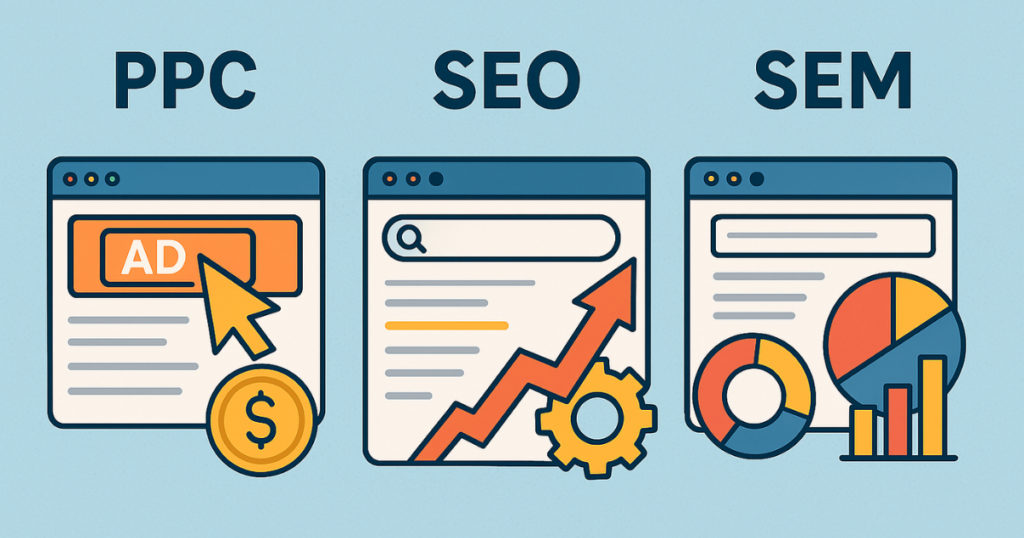
SEO Explained
1. What is SEO and why does it matter?
SEO helps your website show up on Google, so more people can find you online without paying for ads.
Increasing your website’s visibility on Google is known as SEO. Your website receives more visits as a result. Learning the fundamentals as a business owner is beneficial, such as monitoring the performance of your website and utilising intelligent technologies (including artificial intelligence). You can learn through paid or free resources such as expert groups, toolkits, blogs, and courses. The correct tools and advice can help your site expand and remain visible for a long time, regardless of your level of experience.
Why SEO Is Important
People use Google to find things. SEO helps your website show up. More people can see your site, visit it, and trust it. SEO brings free visitors over time. It helps you know what people want and keeps your business easy to find. SEO is a smart way to grow and stay ahead.
- Google will find your website more quickly, safely, and easily if you use technical SEO.
- Your site’s appearance, keywords, and content are all enhanced by on-page SEO.
- Obtaining links and shares from other websites is how off-page SEO increases trust.
Understanding these three areas is essential when approaching SEO from basics to strategy: understanding SEO in 2025.
Which Is More Effective Over Time: Paid or Organic Search?
To increase your website’s visibility on Google, there are two primary methods:
- Organic Search: Free results that appear as a result of effective SEO.
- Paid Search: Advertisements that appear because you have paid for them, such as Google Ads.
Quick results are provided by paid search, but it ends when you stop paying. Although it takes longer, organic search increases credibility. That’s why many businesses opt to develop SEO from basics to strategy: understanding SEO in 2025 as a sustainable long-term plan.
How Search Engines Decide Your Ranking
Search engines like Google use smart programs (called crawlers) to scan and rank websites. They look at things like:
- How fast your site loads
- What keywords you use
- How useful your content is
- How many other sites link to you
Understanding this helps you improve your site and get seen more. Good SEO starts by knowing how search engines see your website.
SEO Made Exceptionally Easy: As Easy as Five
To let Google in, technical SEO ensures everything works, doors are open, and the site is safe and fast.
On-page SEO uses your words, images, and signals (like titles and keywords) to tell Google what your site is about.
Off-page SEO happens when other sites link to yours and say, “Hey, this site is worth visiting!”
When all three parts work together, Google understands your website better and shows it to more users. It’s all part of From Basics to Strategy: Understanding SEO in 2025.
The Evolution of SEO: From the 1990s to 2025
SEO was simple in the 1990s; you could fool search engines to get a higher ranking.
In 2025, SEO has evolved and become more intelligent and user-focused. Google now looks for:
- Excellent, useful content
- What people really want (search intent)
- Mobile-friendly and voice-search-optimized content
- Fast-loading and easy-to-use websites
- AI integration and user experience
These improvements show how important it is to approach SEO with a smart mindset, especially when you’re moving from basics to strategy: understanding SEO in 2025.
Understanding PPC, SEO, and SEM: The Basics Made Easy

- SEO: Helps your website appear in free Google results
- PPC: Paid Google ads that bring immediate traffic
- SEM: Combines both SEO and PPC
If you want long-term, stable results, choose SEO. For quick results, use PPC. To benefit from both, go for SEM.
1. What is SEO and why does it matter?
SEO helps your website show up on Google, so more people can find you online without paying for ads.
2. What are the three main parts of SEO?
It includes how your site works (technical), what’s on your pages (on-page), and who links to you (off-page)
3. How is paid search different from SEO?
Paid search gives fast results, but stops when you stop paying. SEO takes time but keeps bringing visitors for free.
4. What do search engines check to rank your site?
They look at your site speed, helpful content, keywords, and how many other sites link to you.
5. Why is SEO good for long-term growth?
Because it helps you stay visible, earn trust, and get steady traffic without always spending money.
Conclusion: SEO Helps You Grow Online
SEO helps people find your website. It brings free traffic and builds trust over time. You’ve learned the three key parts:
- Technical SEO – makes your site work well
- On-Page SEO – improves your content
- Off-Page SEO – builds trust with links
Keep learning because search engines evolve. Whether you rely on SEO or ads, remember this:
From Basics to Strategy: Understanding SEO in 2025 is the smart way to grow online for the long run.



